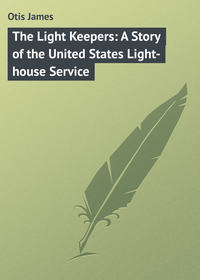 полная версия
полная версияBenjamin of Ohio: A Story of the Settlement of Marietta
I also was eager to see the Indians; but not to such an extent that I would cross over to Fort Harmar with an empty stomach. I therefore told him that I should first make it my duty to go into the woods in search of game.
VISITING THE SAVAGES
He, however, was so insistent that we finally agreed that the forenoon should be spent in looking at the savages, and after that he was to go with me hunting.
It was odd, when we had come to Fort Harmar, to see so many of the brown-skinned people dressed in fanciful garb, as if taking part in some comical festival; but there was about them so much which was disagreeable, that I could not really enjoy the visit.
I fancied that more than one of them looked in an unfriendly manner at us, as if taking offense because of our curiosity, and I was willing to postpone any further acquaintance with them until we were somewhat familiar with their habits and customs.
Ben was not so eager as he had been, and when noon came was ready to accompany me on a hunting trip, as had been agreed upon.
I wish I had the time to tell you all we did during that first afternoon, for indeed it was most interesting.
Roaming through a dirty Indian encampment was not for a single moment to be compared with the pleasure of making one's way among the huge trees, where game was so abundant that a fellow might pick and choose.
Before we had gone half a mile from the fortification, we came upon pigeons and rabbits in what seemed countless numbers, and more than once did we get a glimpse of wild turkeys; but as yet we were not sufficiently versed in hunting to be able to kill them.
Within two hours we had enough meat for the coming week, and, hastening back to our flatboat home, were able before sunset to cut so much wood that Ben declared we might live like gentlemen of leisure during the next few days.
"If we are to make for ourselves names of worth in this country, there must be no idleness," I said half laughingly. "You and I have decided that we will strike out for ourselves, therefore it stands us in hand to earn money, and that without loss of time."
"We will begin bright and early to-morrow morning," Ben replied cheerily. "You shall go one way and I another, each seeking to find some way by which we can earn an honest dollar, and each seeing to it that whatever business is engaged upon, shall be for two, because, as I understand it, you and I are to work in one yoke while we remain here in this town of Marietta."
CAPTAIN HASKELL'S ADVICE
We did not do exactly as Ben proposed when another day had come, and it was none other than Captain Haskell who prevented us from carrying out our plans.
We met the captain just as we were coming out from beneath our shelter, he having strolled that way in order to learn how we might be getting on. Seeing that we were blue and shivering with the cold as we strove to kindle a fire in the stern of the flatboat, he said to us that it would be a good idea if we made of the craft a comfortable home during the winter months.
Then he showed us how, with a little labor, we could build in the stern of the flatboat a shelter which would be quite as good as any hut on shore, save that we might be lodged in one of the best rooms in Campus Martius, and advised that we set about the work before striving to find employment. At the same time he assured us there was no doubt whatsoever in his mind but that two lads who were willing to work, and who would work, might make for themselves a home and a name.
Having given this advice, he turned squarely about, never waiting to see whether we might be willing to follow it, and walked rapidly toward the fortification.
We pondered over his suggestion no longer than it might take a man to count twenty, and then began to discuss how we had best begin the work, in the meanwhile warming up what remained of the roasted pigeons we had cooked for supper.
A NEW FRIEND
While we were thus engaged, the lad Jeremy Salter, of whom I have already spoken, came down to the shore, curious to see who might be remaining on board a flatboat when there was shelter to be had in the town, and without waiting for an invitation, joined us at breakfast, eating considerably more than his share. He told us exactly how we ought to set about making the shelter, and what it might be possible for us to do in the way of gaining employment.
At first it nettled me that this boy should presume to advise us, for he was considerably younger than I; but before he had done with his suggestions, both Ben and I saw that they were not without merit.
He was the son of one of the Salters who had come out from Danvers, and considered himself an old resident of the country because of having been here two months or more. It appeared that he was not very eager to gain employment for himself, claiming that his father was one of those who expected to go farther down the river in the spring to make there another settlement.
However, I must say in his favor that he took hold with us heartily, borrowing two axes, and advising which trees might be felled the easiest, performing himself a due share of the labor, with the result that before two days had passed, thanks to his assistance and advice, we had as good a hut built over the fireplace in the stern of the flatboat as one could desire.
FISHING THROUGH THE ICE
Then Jeremy Salter told us how we might lay in a store of provisions without spending powder and ball. His scheme was to go a short distance from the point, and there fish through the ice.
He not only gave this advice but went so far as to provide us with fishing tackle, and seemed to enjoy himself hugely while aiding in laying up a store of food.
It was no labor, but rather sport, to catch fish in this fashion. We caught them as fast as it was possible to haul in the lines, until when night came and we had made a sort of sled with branches of trees, we had as much of a load as we cared to drag over the ice.
By this time they were all frozen, therefore we stacked them up like fuel in the bow of the flatboat, and I dare say that had we lived on fish alone, we had in the ten hours' fishing enough food for a month.
During all this time that we were building our hut and fishing, Ben Cushing was eager to pay another visit to the Indian encampment; but Jeremy declared that the savages were not in the most friendly mood, even though they had come to make a treaty, and his father had told him plainly that he must not venture near the lodges, lest harm might come.
Such talk as this served to take away Ben's desire to see the wild savages in their own camps, and I was glad because of it, for instead of spending half a day when time was precious, we, with Jeremy's aid, set about laying up a greater store of fuel, until the flatboat had a full cargo of wood and fish, therefore we need not fear hunger or cold during the winter.
THE SABBATH IN MARIETTA
I was glad indeed when the Sabbath came, for I had worked hard and the time of rest was what all of us, including Jeremy, who was living with us rather than in Campus Martius with his parents, most needed.
The greater number of the people assembled in one of the rooms of Campus Martius during the forenoon, where prayers were read and some of the older men talked to us in serious fashion.
The words at that time took even more hold on me than those which I had heard from Parson Cutler's lips at home, for we were indeed needing the protection of God, since there were none of this world who could aid if the savages attacked us suddenly. I believe that both Ben and I came away from that meeting better in heart and with better resolutions for the future, than we had ever had before.
Bright and early on Monday morning Captain Haskell made us another visit and commented favorably upon the shelter we had built, at the same time that he looked curiously at our stack of fish.
"I see no reason why you lads should not sell me half a dozen of these," he said, picking out some of the finest, and Ben Cushing replied promptly that he might have all he wanted for the carrying away.
The captain refused any such offer, saying that he would buy them, otherwise he would go without, and declaring that if we wished, we might sell to the people inside the fortification no small amount of fish during the winter season, for there were plenty who did not feel disposed to spend their time on the river while the weather was so cold.
A REGULAR BUSINESS
He gave us a shilling for as many as he could carry, and bade us follow him to Campus Martius, where within an hour we took orders for as many as we had in the flatboat, at prices much the same as that paid by the captain, and straightway without our seeking it, there came to us a means of earning money sufficient to provide ourselves with ammunition for hunting.
You would not have the patience to read all I could write about our work during that winter.
There was never man nor woman in Campus Martius who could come out and beckon us, but that we were ready to furnish him or her with as much fish as was wanted, until we had gathered in no less than seven dollars and three shillings, by working in a way which was much like sport. Of this amount we spent a little more than one half to purchase a store of powder and lead, for it was our intention to add the business of hunting to that of fishing.
Thanks to Jeremy Salter, we borrowed from a kind man who had come out with Colonel Sproat two muskets, with the understanding that if at any time before spring we were ready to pay twelve dollars for each, they might become our property.
From this time on we fished when the weather was too stormy for successful hunting, and roamed the woods during pleasant days, coming back to our flatboat home each night literally laden with game or fish; and although any man in Marietta could have done the same, we had no difficulty in selling it all.
Of the ceremony of making the treaty with the Indians we saw nothing, and for the very good reason that we could not afford to spend the time.
A VISIT FROM THE SAVAGES
Just then it seemed as if every man in the settlement was eager to know what might be going on around Fort Harmar, and therefore the demands upon us hunters increased to such an extent that we could hardly supply the food which was desired.
In addition to the fact that we were unable to be present during the treaty making, save at the price of losing the chance to earn considerable money, Ben Cushing had lost all desire to see the savages at close quarters.
One afternoon just before sunset, when we had come in from fishing, two Delaware braves came over to our flatboat and made themselves very much at home, without any invitation. In fact, they carried matters with a high hand, as if having the right to do as they pleased, and when Ben made a stout protest against their eating the food intended for our own supper, one of them behaved in such a threatening manner that for a moment I thoroughly believed he was about to strike the lad down, therefore I hastily caught up one of the axes, believing I should be called upon to fight for my life.
When the Indians had eaten until it was impossible to eat more, they having literally forced us to cook for them, the two stalked away, and from that time forth Ben never said anything regarding a desire to visit the encampment.
We hunted or fished during every moment of daylight while the treaty making was going on, and when it had come to an end we had so many dollars in our possession as satisfied us fully for having failed to witness the ceremony.
BUILDING A HOME
It was at this time, when we were so prosperous, that Jeremy Salter declared we ought to set aside a certain day in each week for the work of building a house for ourselves on the eight-acre lot, which we now knew could be paid for at any time, since we had more than sufficient money in our possession.
Thus, thanks to Jeremy, we set about building our home, working whenever the demand for game or fish was light, or when it stormed so furiously that we could not well go on the river or in the woods. When spring came and the snow had disappeared, we had as solidly built a cabin as could be found anywhere in Marietta outside Campus Martius.
Thus far we had accomplished a portion of our purpose. The people had come to understand that if we promised to provide them with a certain kind of game or fish, the promise would be kept to the letter. I am saying this not to praise myself, but simply to show we were making a name for ourselves as lads who told the truth, and kept strictly to their bargain.
As I looked at the matter, this was of greatest value to us. We had set about gaining a good reputation, and verily we had begun aright, though only in small matters. It remained to show whether we were of such stuff as settlers in a wild country should be made.
Before the first day of March we had paid for our eight-acre lot, had built a cabin of two rooms, in which was stored as much frozen game and fish as would keep sweet until warm weather came, and, in addition, had nineteen dollars which we could call our own.
A GREAT PROJECT
One day, when the rain came down in torrents, and we were not inclined either to fish or hunt, Captain Haskell came to make a friendly call, and, in no spirit of curiosity, but rather because of the interest which he had evidently taken in us, asked how we were progressing.
Without hesitation I told him exactly how we stood in the world, whereupon he praised us highly, and then proposed a scheme which fairly caused me to hold my breath in amazement, for it did not seem possible we could venture so far as his plan led.
His idea was that we build a water mill by buying from himself and Master Rouse the flatboat in which we were still living and by putting alongside of it a second one, the two to be fastened side by side in such a manner that a water wheel could be worked between them, and the double craft anchored in the current, where sufficient power could be had to drive the mill.
As to the stones for grinding and such small pieces of machinery as we might need, he figured that we could buy them either in Pittsburgh or from some craft which came up the river, and when I asked him how far he thought our store of money would go in such a project, he laughingly replied that Uncle Daniel and he would lend us a sufficient amount to pay for all we might need, and take from us in return three-quarters of the entire earnings until the debt, with interest, had been canceled.
When Ben Cushing asked if he believed we should find business enough to warrant the undertaking, he replied: —
"There are about two hundred people here now and twice as many coming from Massachusetts during the summer. Now, since there is no mill here and all the corn must be ground by hand, I am asking whether you do not believe that by harvest time a single mill such as Uncle Daniel and I propose you shall build, will be kept running during every hour of daylight?"
THE TWO MILLERS
We discussed the matter earnestly, as you may well suppose, and Uncle Daniel, coming aboard before we had finished the conversation, did his share of arguing. Before nightfall it was settled that on the following morning we should begin work on a second flatboat, and also repair the old craft in which we had come down from Sumrill's Ferry.
And all this we did, working with a hearty will far into each night, because it was possible to see before us a way of getting on in the world faster than we had ever dared to dream, and you may be sure we wasted no minute of daylight.
We had expected to cultivate our eight acres, and, in fact, when spring came we did put in a crop of corn; but the making of the mill and providing ourselves with food occupied so much of our time that we could not well afford to spend many hours as farmers, more particularly since both Uncle Daniel and Captain Haskell insisted that as soon as the mill was in working order we could earn double or treble as much as it would be possible to get from the ground.
And it all came about as these two good friends of ours predicted. The mill was a success from the first day we were ready to turn the wheel, and has continued so until now, when we are in sorest trouble.
THE SAVAGES ON THE WARPATH
From the time of our coming into this Ohio country, Marietta had steadily increased in size, the people coming, as it seemed to me, from every part of the eastern colonies, and just when Ben and I were congratulating each other that our lines had been cast in peaceful, pleasant places, even though we were settled in the wilderness, the Indians began their bloody work which we now fear may result in wiping out this settlement.
The treaty which had been made by the savages just after we arrived was kept only by the white men. Hardly more than two weeks ago news came that Captain King had been killed at that settlement to which Uncle Daniel went in the spring, while four others were slain in the forest, and one taken prisoner.
The savages are in arms against us. We have been forced to come into Campus Martius for safety; work of all kinds has been abandoned; our mill is moored far up the Muskingum River, where we have a faint hope it may escape destruction.
Although it may be that within the next four and twenty hours both Ben and I will have fallen beneath the tomahawk, yet must I bear witness that God has been good to us indeed. He has permitted two lads so to make their way in the world with nothing save their own hands as stock in trade, that now, as I have good reason for believing, we are counted among the responsible citizens of the town.
And of this it seems to me I had good proof no longer ago than yesterday, when I heard General Putnam say while he and some other of the men were discussing the possibilities of an Indian war: —
"If evidence were needed that it is well for young, willing workers to come into the wilderness, then I would point out to you that lad who journeyed with Mistress Devoll, and who, with his comrade, has laid up more than a fair share of this world's goods by unceasing work and unswerving honesty. He has done no more than many another might have done; but it has pleased me to watch the lad, and when I think of him it is always as our cheery-faced, upright miller, Benjamin of Ohio."











